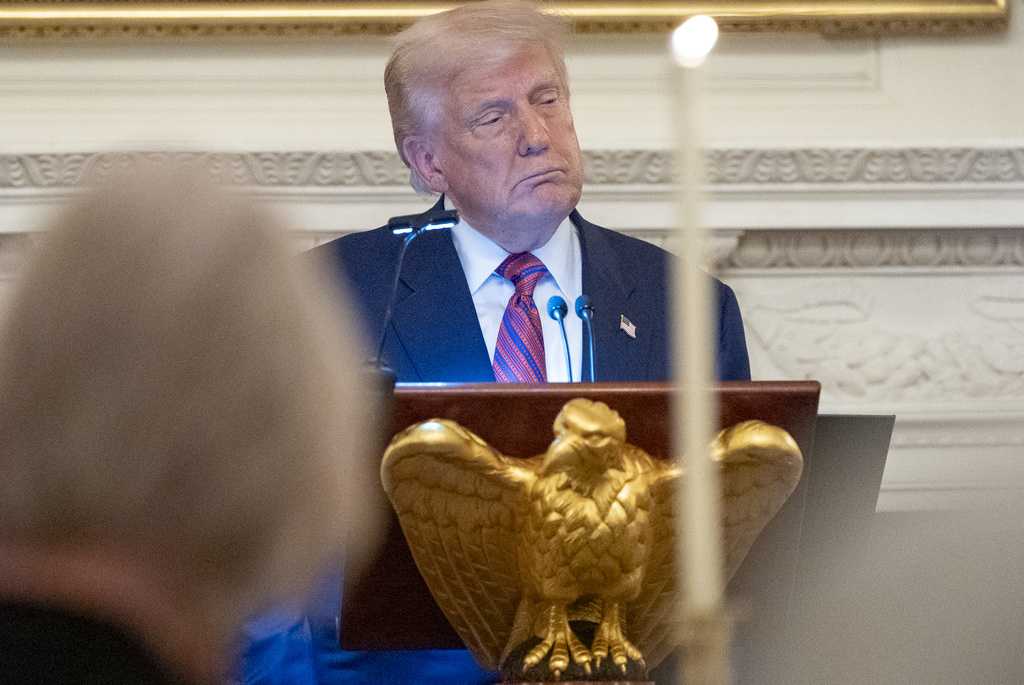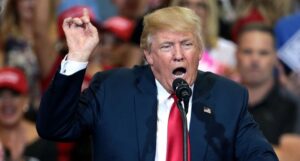
UPDATE: In a significant shift in political power, President Donald Trump is increasingly asserting dominance over a compliant Congress, as evidenced by a recent signing ceremony on July 4. House Speaker Mike Johnson presented Trump with a ceremonial gavel, symbolizing the growing influence of the presidency as lawmakers rapidly advance Trump’s legislative priorities.
This development raises alarms about the erosion of Congressional authority, with Republicans in both the House and Senate demonstrating a striking willingness to acquiesce to the president’s demands. In an unprecedented move, Congress recently agreed to rescind $9 billion in previously approved funding at Trump’s request, challenging the long-standing power of the purse.
During the signing ceremony, Johnson exclaimed, “Mr. President, this is the gavel used to enact the ‘big, beautiful bill,'” handing it over to an enthusiastic Trump, who immediately tested it out. This moment underscores not only a celebration of Republican legislative victories but also a troubling shift towards the consolidation of power within the executive branch.
Since Trump’s return to office in January, he has faced minimal resistance from his party, with Congress fast-tracking a package of tax breaks and spending cuts to meet his Independence Day deadline. This comes as lawmakers have shown a disturbing readiness to overlook significant risks to their constituents and the institution itself.
In a striking contrast, Congress has stalled efforts to impose sanctions on Russia over its ongoing war in Ukraine, following Trump’s decision to grant President Vladimir Putin an additional 50 days for negotiations. This has dashed hopes for a quicker resolution to the conflict, further highlighting the balancing act of power between branches of government.
Senators swiftly confirmed most of Trump’s Cabinet nominees, even amidst serious reservations regarding figures like Robert F. Kennedy Jr. and Pete Hegseth. Meanwhile, Trump has urged Congress to investigate perceived adversaries, including President Joe Biden, intensifying partisan tensions.
Even as some lawmakers, like Senator Lisa Murkowski of Alaska, voice their dissent against this consolidation of power, many Republicans appear aligned with Trump’s agenda. Murkowski stated, “We’re lawmakers. We should be legislating,” expressing concern over the White House dictating priorities.
Former GOP Senator Jeff Flake has criticized the current state of the party, asserting that “the fever still hasn’t broken,” as those who oppose Trump face significant backlash. Many Republican lawmakers now owe their political careers to Trump’s “Make America Great Again” movement and are increasingly adopting his combative style.
As the legislative branch seems to diminish, the judicial branch is left to uphold checks and balances, processing numerous lawsuits against the administration. Democratic leaders, including former Speaker Nancy Pelosi, have emphasized the risks of ignoring the foundational principles of the U.S. Constitution, stating, “The genius of our Constitution is the separation of power.”
The political landscape is poised for further turmoil as dissenters within the party, such as Rep. Thomas Massie of Kentucky, continue to challenge Trump’s directives. With increasing pressure from the White House, the future of Congressional independence hangs in the balance.
As Trump capitalizes on this moment, political observers are watching closely to see how this evolving power dynamic will influence legislative action in the coming weeks. The implications of these developments could reshape the Republican Party and its relationship with the presidency, marking a crucial point in American political history.






